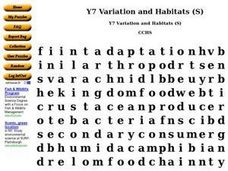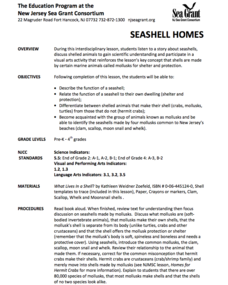Curated OER
Investigate Science Using Crayfish
Young scientists discover the importance of scientific investigation by observing live crayfish. They carefully observe the patterns of crayfish in different environments. Then they discuss their conclusions and define what all living...
Wilderness Classroom
Ocean Life
Our oceans are composed of many complex relationships. Young oceanographers explore relationships between organisms, understand the world ocean's currents, and discover the effects of water pollution and how it behaves. There are three...
Curated OER
Invertebrate Diversity
Comparative anatomy prevails in the lesson exploring diversity among invertebrates. Biologists examine physical characteristics of an earthworm from phylum annelida and a meal worm from phylum insecta. They also inspect a cricket and a...
Consortium for Ocean Science Exploration and Engagement (COSEE)
Life in an Ocean World
How does the shell color of crabs and the habitat they live in impact the predator-prey relationship? The fourth lesson in a series of five is a game where participants try not to get eaten if they are a prey and try to eat if they are...
Consortium for Ocean Science Exploration and Engagement (COSEE)
Life Cycle of Blue King Crabs
The blue king crab and the red king crab live in the same range but never in the same region. The third lesson in the series of five focuses on the blue king crab and the impact the changes in water temperature is having on its habitat....
Consortium for Ocean Science Exploration and Engagement (COSEE)
Climate Change Impacts on Blue King Crabs
Carbon dioxide is not only causing global temperatures to increase, it causes the oceans to become more acidic. Lesson focuses on the blue king crab and the fragility of the habitat due to climate change. Scholars create a concept map...
Curated OER
Y7 Variation and Habitats (S)
In this biology instructional activity, students identify and locate various vocabulary terms relating to variations and habitats of living things. There are 37 biology terms located in the word search.
Curated OER
Minibeasts: What Sort is It?
In this insect related worksheet, students research and describe a variety of insects to see if they have several legs or a large foot. Students then decide what type of insects they are dealing with.
Curated OER
Diversity of Arthropods
In this arthropods worksheet, students will review the characteristics of the different types of arthropods including spiders, ticks, crustaceans, millipedes, and insects. Students will also understand the difference between complete and...
Curated OER
Fish Parasite Survey
Students survey and dissect as many fish as possible. They count nematodes, cestodes and crustaceans on the fish, fill out autopsy reports, and transfer data to a chalkboard data table. Students graph the results of the entire class...
Curated OER
Seashell Homes
Pupils listen to a story about seashells. They discuss shelled animals. Learners describe the function of seashell. Pupils relate the function of a seashell to their own dwelling. They differentiate between shelled animals that make...
Curated OER
The External Anatomy of the Crayfish
Students investigate the external anatomy of a crayfish. In this arthropod lesson plan, students study the structures of the head, the body and the appendages of a crayfish. They locate specific structures present in arthropods and...
Curated OER
Hermit Crabs in the Classroom
Young scholars interact with hermit crabs in the their classroom. In this hermit crab lesson, students handle and observe hermit crabs while learning about their habitats and how to treat animals. They watch how the animals move and...
Curated OER
Love A Lobster
Learners discuss the appearance of a lobster. Using pre-cut parts, they create their own lobster and name each part of its anatomy. As a class, they listen and participate in exploring background information on the lobster and its...
Curated OER
Crayfish Dissection Worksheet
In this crayfish dissection worksheet, learners answer 11 questions about crayfish bodies. One question requires students to label all the parts of a crayfish body.
Curated OER
What Lives In A Shell?
Younger students focus on animals and animal habitats in the lower grades. This resource defining habitats focuses on sea animals with shells, but could be augmented to be a richer experience.
Curated OER
Crab Crossword Puzzle
In this crab worksheet, students read ten clues that pertain to sea crabs. Students match these to vocabulary words in a box. Students fit their answers in a crossword puzzle.
Curated OER
The Crusty Fossils
Students identify some of the different species of crabs and tell how they adapt themselves to their environment. They discuss the evolution and stages of development of the crabs. They identify the Phylum Arthropoda and the Class...
Curated OER
Sea Otter Maze
In this mazes instructional activity, students determine the best strategy to assist a sea otter to finding some crabs to eat through a difficult maze.
Curated OER
Be an Artist: Hermit Crab
In this science worksheet, 3rd graders use visual clues in a grid to complete an exact image replica. Following the original line segments in each box, students create the image of a hermit crab.
Curated OER
Crab Word Search
In this crab word search worksheet, students locate and identify 8 crab-related words within the word search puzzle.
Curated OER
Digital Dissections
Young scholars dissect organisms and take photographs to create a PowerPoint dissection library. In this anatomy lesson, students dissect organisms that interest them and photograph the process while identifying structures. They create a...
Curated OER
Grandma Crab
In this crab life cycle worksheet, students read a 1-page monologue that included details regarding the life cycle of a crab.
Curated OER
Crab: Print and Color
In this word recognition activity, students trace the word "crab," write the word independently, and color the picture of the crab.
Other popular searches
- Marine Crustaceans
- Shells and Crustaceans
- Crustaceans of the Ocean
- Crustaceans Kindergarten
- Crustaceans 2nd Grade
- Crustaceans Animals

























